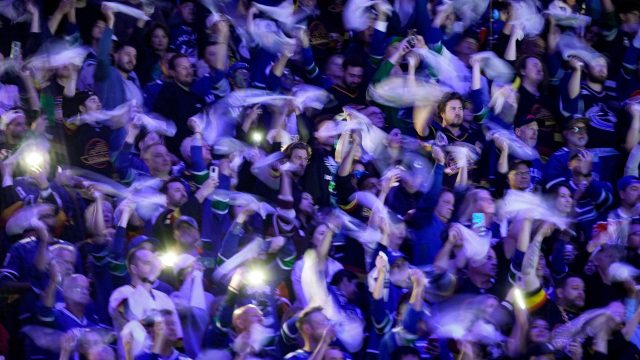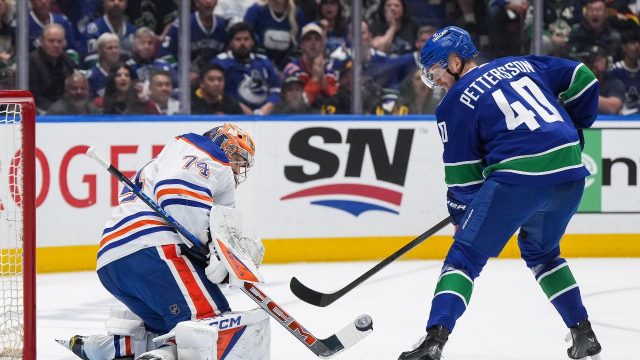
VANCOUVER — In time, the Vancouver Canucks will probably look back proudly at all they accomplished this season.
They’ll be happy with the 50-win, 109-point, division-winning regular season that no one saw coming. They’ll be grateful for the culture they’ve built under coach Rick Tocchet, the standards they’ve established among themselves, the relationship they mended with a fan base that had been conditioned for and poisoned by disappointment over many years.
They should be proud of their pile of individual achievements, like J.T. Miller’s 103 points, Brock Boeser’s 40 goals, Quinn Hughes’ Norris Trophy nomination, Thatcher Demko’s Vezina Trophy nod, and Arturs Silovs’ emergence in the playoffs as a legitimate National Hockey League goaltender.
You will probably hear them speak about these achievements in the coming days, but it will be a while before any of the Canucks take real joy in the recollection.
With their wonderful season facing termination, with the chance to win a Game 7 on home ice to advance to the Stanley Cup semifinals for just the fourth time in franchise history, the Canucks fell behind the Edmonton Oilers by three goals on Monday before a desperate third-period push left them with a 3-2 loss at Rogers Arena.
Playing for their stars’ legacy, instead of the mere respect and recognition, the Oilers move on to face the Dallas Stars in the Western Conference Final.
Vancouver’s surge in the final minutes of its season, its stubborn refusal to go quietly, was typical of the Canucks.
But including the team’s no-show in Game 6 when the Oilers tied the series on Saturday with a 5-1 win in Edmonton, the Canucks were poor for 4½ of their final six periods.
And this will haunt them for a while.
It was an uplifting year, but a crushing end.
“We were never going to go quietly,” Canuck winger Conor Garland whispered. “We were one game away from the conference final. I’ll be thinking about this for a while. It just sucks. As a group, we fought to the end. I never, never doubted that we would.
“I lost games in junior that I still stay up at night and think about, so this will hurt for a long time.”
Missing both Demko and Boeser due to injuries, the Canucks looked overmatched in the first half of Game 7 as the Oilers scored three times in the second period after Silovs somehow kept the game scoreless while Edmonton was outshooting Vancouver 13-2 in the first.
But then Garland pounced on a Ryan McLeod turnover and slung a wrist shot past Oilers goalie Stuart Skinner at 11:27 of the final period. And Filip Hronek blasted a slapshot through traffic to make it 3-2 with 4:36 remaining.
Skating six-against-five, Miller drilled a heavy one-timer from the high slot that hit teammate Nikita Zadorov with 13 seconds to go.
“I mean, there’s no quit in this team,” Tocchet said. “The third period, parts of the second, there was no quit. Really proud of the guys. Unreal. Millsy, if that shot gets through Z, that’s in the net. Made a huge push there. I’m really proud of them.”
Asked what he has learned about his group, Tocchet’s voice appeared to catch briefly with emotion.
“I’ve been here a year and a half, (and) just the buy-in and the way they want to play,” he said. “Listen, they put respect back into this city and this jersey. The fans have got something to be proud about. And it’s all because of the players.”
Tocchet should win the Jack Adams Award as coach of the year. So it’s not all about the players.
But he was certainly right about the restoration of the Canuck brand and the powerful reconnection between the organization and its fans.
When it was 3-0, fans inside the arena, probably the loudest of the Stanley Cup tournament, spontaneously began chants for Elias Pettersson, Garland, Miller and Silovs. Most of them stayed in their seats through the post-game handshakes and roared one more time when Canuck players raised their sticks in thanks.
A couple of years ago, players would have been ducking beer cups and popcorn showers.
“I tell you what, it hit me emotionally at the end of the game when they’re cheering for us,” Miller said. “When you see that, you know you’re in a good place, in a good market. And it’s just the beginning, hopefully, of really good things here in the future.
“You’ve got to go through this (to learn about the playoffs). I think so many players, so many of our core players, learned a lot, what it takes — the emotion of the building and how it can swing so quickly. And I’m sure, even right now, their hunger to get back here already is going to be there. I think we have a good thing going on here, and I just believe that we’re going to be a good hockey team and we’re going to have another opportunity.”
They should, but there are no guarantees.
Among their very best players, only Miller and Boeser found another level for the playoffs. Pettersson struggled badly until the last couple of games and even Hughes, as consistently impactful as he was elite during his 92-point regular season, struggled to be effective at times as physicality increased and space disappeared.
But they should all be better for the experience. For all the core players except Miller, these playoffs were their first genuine Stanley Cup tournament games. These were the first playoff games in Vancouver since 2015.
“It’s hard not be emotional at the end there,” Garland said of the fans’ embrace. “They are the best. It’s too bad we came up short. But we’ll be better for this. This past month, it’s been a blast.”
The players came a long way, literally and figuratively. The 95-game Canuck season was a magnificent success even if the final two games leave a scar that will become permanent unless the team gets past the playoffs’ second round in the next few years.
“At the exit meeting, I’ll probably have a better answer for you,” Miller said. “But right now, it just sucks, when you’re that close. We’ve got a lot of (guts), played with a lot of resiliency and we’ve come back a lot of times. For the game to end like that — I know we didn’t win — (it’s a) representation of the culture we’re trying to build here.”






